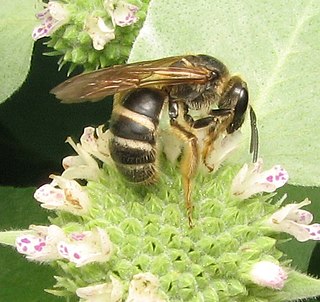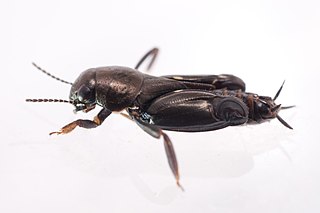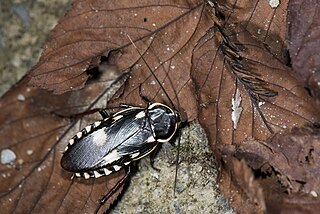
Bandwings, or band-winged grasshoppers, are the subfamily Oedipodinae of grasshoppers classified under the family Acrididae. They have a worldwide distribution and were originally elevated to full family status as the Oedipodidae. Many species primarily inhabit xeric weedy fields, and some are considered to be important locusts:

Periplaneta is a genus of cockroaches containing some of the well-known pest species with cosmopolitan distributions, such as:

Opisthotropis is a genus of snakes in the subfamily Natricinae of the family Colubridae. The genus is native to Southeast Asia and South China.

Anterhynchium is an Afrotropical, Indomalayan, Australian and Palearctic genus of potter wasps. As in many species of wasp, female wasps defend against predation using a modified ovipositor to sting predators. Like some other wasps in the Vespidae family, male wasps can produce a "pseudo-sting" with two sharp spines on either side of their genitals; however, unlike in the females, this "sting" is venomless.

Gryllus is a genus of field cricket. Members of the genus are typically 15–31 mm long and darkly coloured. The type species is Gryllus campestris L.: the European field cricket.

Ropalidia is a large genus of eusocial paper wasps (Polistinae) in the tribe Ropalidiini distributed throughout the Afrotropical, Indomalayan and Australasian biogeographical regions. The genus Ropalidia is unusual because it contains both independent and swarm-founding species. Ropalidia romandi is one of the swarm founding species, meaning that new nests are founded by a large group of workers with a smaller number of inseminated females, while Ropalidia revolutionalis is independent-founding, meaning that each nest is founded by a single foundress.

In biology, Lipotriches is a large genus of sweat bees in the family Halictidae, distributed widely throughout the Eastern Hemisphere though absent from Europe. There are nearly 200 species in 9 subgenera. They commonly have prominent bands of hair on the margins of the metasomal segments.

The Phaneropterinae, the sickle-bearing bush crickets or leaf katydids, are a subfamily of insects within the family Tettigoniidae. Nearly 2,060 species in 85 genera throughout the world are known. They are also known as false katydids or round-headed katydids.

The Eneopterinae are a subfamily of crickets, in the family Gryllidae, based on the type genus Eneoptera. It is one of several groups widely described as "true crickets". Of the more than 500 species that make up this subfamily, most occur in moist, tropical habitats. These insects are medium to large and brown or gray in color. They eat plant leaves, flowers, and fruits and can occasionally cause economic damage. Their eggs are deposited in pith, bark, or wood. Eneopterinae show a great diversity in stridulatory apparatus, signals emitted, and associated behaviour.
Liopteridae is a family of wood-boring parasitoid wasps. They occur worldwide with concentrations in the African Tropics. These insects have a petiolate abdomen. There are 10 genera and more than 140 species known.

Calolampra is a genus of Australian cockroaches in the family Blaberidae.

Halictini is a tribe of sweat bees in the sub-family Halictinae.

Xya is a genus of pygmy mole crickets, with species recorded from Africa, southern Europe, Asia and Australia.

Podoscirtinae is a subfamily of crickets in the family Gryllidae.

Ripipterygidae is a family of insects in the order Orthoptera. Members of the family are commonly known as mud crickets.

Gryllini is a tribe of crickets and typical of the family Gryllidae. Species are terrestrial, carnivorous or omnivorous and can be found in all continenents except Antarctica.

Deropeltis is a genus of African cockroaches in the family Blattidae, also known as hunchback roaches, erected by Hermann Burmeister in 1838.

Rhabdoblatta is a genus of cockroaches in the subfamily Epilamprinae. Species have been recorded from Africa, East, Southeast and South Asia.

Paranauphoeta is a genus of South East Asian cockroaches in the family Blaberidae and the monotypic subfamily ParanauphoetinaeRehn, 1951, erected by Carl Brunner von Wattenwyl in 1865. Species records are from India, China, Indochina, Malesia and New Guinea.


















